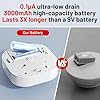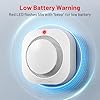If your heat detector is beeping, it is likely because the battery needs to be replaced. Heat detectors are an important part of your home’s fire safety system, so it is important to keep them in good working order.
If you have a heat detector in your home that is beeping, it is important to determine the cause of the problem before resetting or discarding the device. There are several reasons why a heat detector may beep, including low battery, end of life, or a problem with the internal sensor.
If the heat detector is beeping due to a low battery, simply replace the battery and reset the device. If the heat detector is beeping due to an end of life, the device should be replaced. If the heat detector is beeping due to a problem with the internal sensor, the device may need to be sent back to the manufacturer for repair or replacement.
Contents
How to troubleshoot a beeping heat detector?
When a heat detector is beeping, it is trying to indicate that there is a problem. There are a few things that you can do to troubleshoot the issue and determine what the problem is.
First, check the battery. If the battery is low, it will cause the heat detector to beep. Replace the battery with a new one and see if that stops the beeping.
If the heat detector is hardwired, check the wiring to make sure it is secure and there are no loose connections. If everything looks good, reset the heat detector by pressing the test button.
If the heat detector continues to beep, there may be a problem with the unit itself. In this case, it is best to replace the heat detector.
Why is my smoke detector beeping?
If your smoke alarm is beeping, it may be indicating that the battery is low. Replace the battery in your smoke alarm and the beeping should stop. If the beeping continues, it may be an indication that the alarm is nearing the end of its useful life and should be replaced.
How to test your heat detector?
As a homeowner, you should test your heat detector monthly to ensure it is working properly. There are two types of heat detectors: rate-of-rise and fixed-temperature.
To test a rate-of-rise heat detector, simply wave your hand in front of the detector. The detector should sound an alarm within seconds.
To test a fixed-temperature heat detector, use a hairdryer to blow warm air onto the detector for 30 seconds. The detector should sound an alarm within 30 seconds.
If your heat detector does not sound an alarm when tested, it may be time to replace the batteries. If the batteries are new and the detector still does not work, you may need to replace the detector.
How often should you replace your heat detector?
The answer to this question depends on the specific heat detector model in question. Some models will have a specific lifespan listed in the manufacturer’s instructions. Others may not have a listed lifespan, in which case it is generally recommended to replace the heat detector every 10 years.
Some factors that can contribute to needing to replace a heat detector sooner include exposure to excessive dust or debris, frequent power outages, or extreme temperature fluctuations.
What to do if your heat detector is beeping?
If you have a heat detector that is beeping, there are a few things you can do to troubleshoot the issue. First, check the batteries. If the batteries are low, replace them. If the batteries are not the issue, check to see if there is anything blocking the detector.
Heat detectors can be blocked by dust, dirt, or other debris. If there is something blocking the detector, remove it and see if the detector stops beeping. If the detector is still beeping, it may be faulty and need to be replaced.
How to prevent your heat detector from beeping?
If you have a heat detector beeping, there are a few things you can do to prevent it. First, make sure that the batteries are replaced regularly. If the batteries are old, they may not be able to provide enough power to keep the heat detector from beeping.
Second, keep the heat detector clean. Dust and dirt can build up on the sensing elements, causing the heat detector to be more sensitive and more likely to trigger false alarms. Finally, make sure that the heat detector is properly installed. If it is not installed correctly, it may not be able to properly sense heat, resulting in false alarms.
Summary
If your heat detector is beeping, it may be because the batteries need to be replaced. Alternatively, the beeping may indicate that the detector is too close to a heat source, such as a stove. If the heat detector is hard-wired, the beeping may signal a problem with the wiring. In any case, it is important to take action to determine the cause of the beeping and address the issue.



















